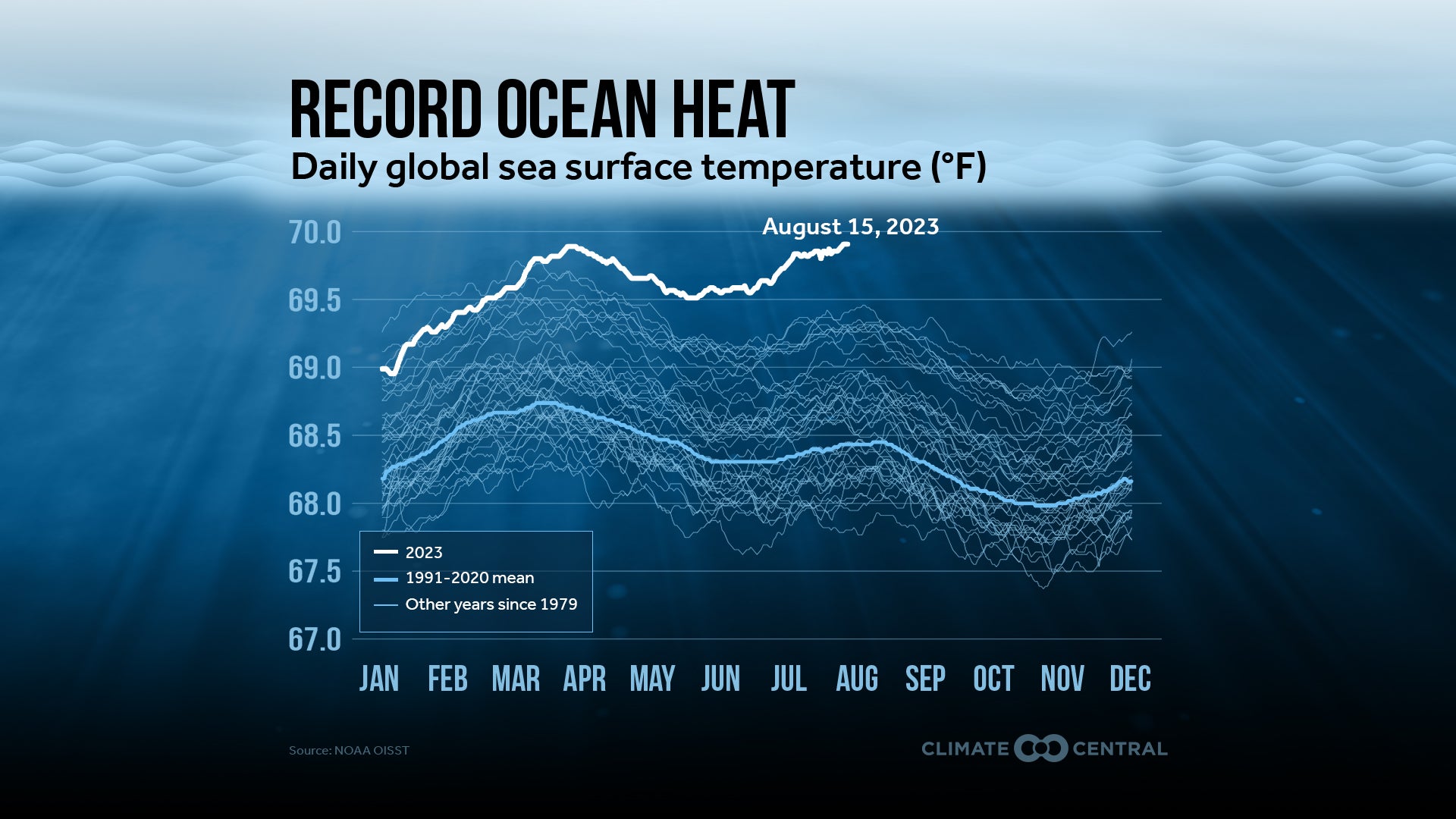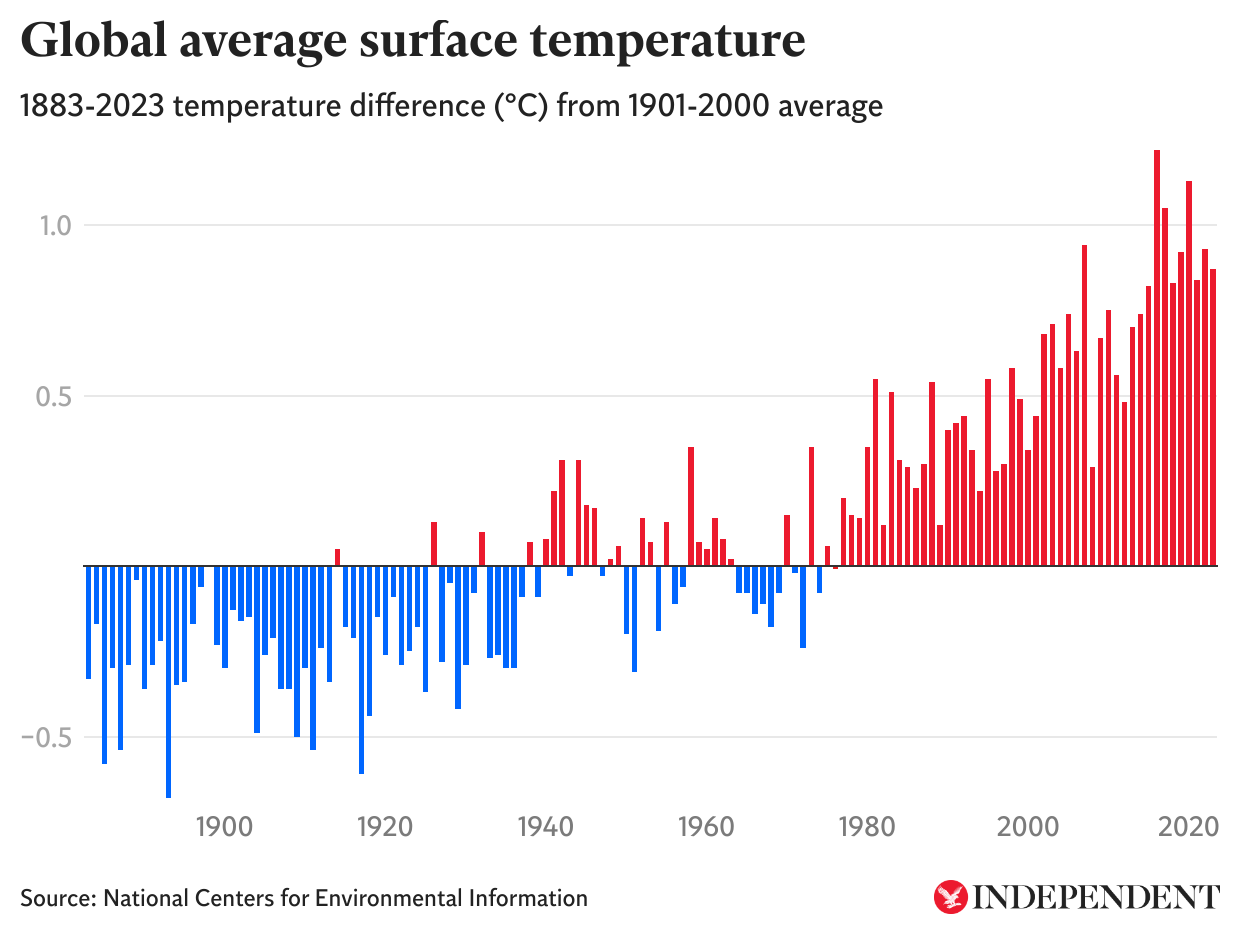Earth experienced ‘hottest summer on record’ in 2023, UN says
‘Climate breakdown has begun,’ says United Nations chief as August temperatures smash records again
Your support helps us to tell the story
This election is still a dead heat, according to most polls. In a fight with such wafer-thin margins, we need reporters on the ground talking to the people Trump and Harris are courting. Your support allows us to keep sending journalists to the story.
The Independent is trusted by 27 million Americans from across the entire political spectrum every month. Unlike many other quality news outlets, we choose not to lock you out of our reporting and analysis with paywalls. But quality journalism must still be paid for.
Help us keep bring these critical stories to light. Your support makes all the difference.
The sweltering summer of 2023 has been officially confirmed as the “hottest summer on record” for the northern hemisphere by the United Nations.
This August was found to be about 1.5 degrees Celsius (2.7 degrees Fahrenheit) hotter than pre-industrial times, scientists from the World Meteorological Organisation (WMO) and the European climate service, Copernicus, announced on Wednesday.
The hottest August ever is also the second hottest month ever after this July, WMO said.
August marked the end of a brutal summer in the northern hemisphere with land and ocean heat records shattered across continents; extreme heatwaves and deadly wildfires.
“The dog days of summer are not just barking, they are biting,” United Nations Secretary General Antonio Guterres said in a statement. “Climate breakdown has begun.”
Both July and August crossed the 1.5C threshold - warning signs that the world is moving closer to permanently breaching the 1.5C global temperature goal set by the landmark 2015 Paris Agreement to limit catastrophic warming.
And so far, September’s temperatures also show record highs for the time of year, according to the University of Maine’s Climate Reanalyzer.
“What we are observing, not only new extremes but the persistence of these record-breaking conditions, and the impacts these have on both people and planet, are a clear consequence of the warming of the climate system,” Copernicus Director Carlo Buontempo said.

Not only do records show that July and August’s temperatures stand out in comparison to the last couple of centuries, scientists have used tree rings, ice cores and other proxies to estimate that current temperatures are hotter than they have been in 120,000 years.
While the world has experienced hotter and more extreme temperatures before, it was prior to human civilisation, when seas were much higher and the poles were not icy, scientists said.
“Breaking heat records has become the norm in 2023. Global warming continues because we have not stopped burning fossil fuels. It is that simple,” says Dr Friederike Otto, senior lecturer in Climate Science at the Grantham Institute, Imperial College London.
2023 is so far tracking to be the second hottest year on record behind 2016, according to Copernicus.
In 2016, the El Nino in the Pacific drove extreme temperatures, and the cyclical phenomenon is now in full swing again amplifying the levels of heat caused by the climate crisis.
Several records broken this year have shocked scientists. The world’s oceans are the hottest ever recorded at an average of nearly 21C (69.8F), and setting high-temperature marks for three consecutive months, the WMO and Copernicus said.
Hotter ocean temperatures are fuelling stronger hurricanes in the Atlantic, scientists say.

“Extreme weather events are now common and getting worse every year - this is a wake up call to international leaders that we must rapidly reduce carbon emissions now,” says Mark Maslin, professor of climatology, at University College London.
“Let us hope this message hit home at Cop28 in Dubai this December and action actually happens.”
The upcoming UN climate summit will see world leaders gather once again to try to hammer out deals to transition away from the fossil fuels which are driving global heat to these unprecedented extremes.
The action so far has been indequate, scientists and campaigners warn.
“Even those still with their heads in the sand on climate action must now be wondering why their butts are so very hot,” David Reay, professor of Carbon Management, Executive Director of Edinburgh Climate Change Institute, University of Edinburgh, said.
“We’ve had some many wake up calls on climate change, the declarations of emergency, and the ‘code reds’. If the upcoming Cop28 climate summit doesn’t deliver drastic cuts in global fossil fuel use and emissions then we can officially call the 2020s the Age of Stupid.”




Join our commenting forum
Join thought-provoking conversations, follow other Independent readers and see their replies
Comments